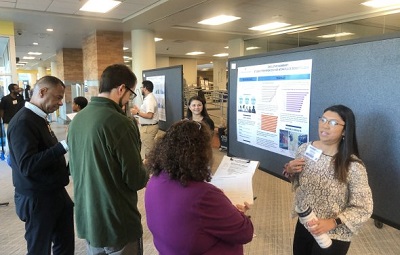Do Atlantic Brief Squid (Lolliguncula brevis) School?
Description/Abstract/Artist Statement
Schooling in the aquatic realm is a collective behavior in which animals swim in synchronized, directionally polarized groups. This behavior provides ecological benefits for many nekton, including reduced energy expenditure, improved predator avoidance, and enhanced detection of prey. Despite the ecological relevance of schooling, little is known about collective behaviors of squids. In this study, we caught Atlantic brief squid Lolliguncula brevis using an otter trawl, transported animals back to Old Dominion University’s Marine Aquatic Facility, and recorded their behaviors as they swam in a holding tank using high-speed videography. We selected sequences, 2-3 seconds in length, that represented ‘organized’ and ‘standard’ groupings, and measured orientation angles (OA), nearest neighbor distances (NND), and group area. We found that differences in OA among individuals in the group and NND were significantly lower for organized vs standard groups, while area was not significantly different, suggesting that global spacing was not a confounding factor. For organized groupings, mean difference in OA among individuals was 6.4 ± 0.60 deg and mean NND was 9.2 ± 0.53 cm (~2 mantle lengths), compared to 61.0 ± 6.27 deg and 11.5 ± 0.62 cm (~3 mantle lengths), respectively, for standard groupings. The results indicate that brief squid can exhibit highly aligned, tightly spaced collective behaviors (schooling) similar to those reported for fishes.
Faculty Advisor/Mentor
Dr. Ian Bartol
Faculty Advisor/Mentor Department
Biological Sciences
College Affiliation
College of Sciences
Presentation Type
Poster
Disciplines
Biomechanics | Integrative Biology | Marine Biology
Session Title
Poster Session
Location
Learning Commons Lobby @ Perry Library
Start Date
3-30-2024 8:30 AM
End Date
3-30-2024 10:00 AM
Do Atlantic Brief Squid (Lolliguncula brevis) School?
Learning Commons Lobby @ Perry Library
Schooling in the aquatic realm is a collective behavior in which animals swim in synchronized, directionally polarized groups. This behavior provides ecological benefits for many nekton, including reduced energy expenditure, improved predator avoidance, and enhanced detection of prey. Despite the ecological relevance of schooling, little is known about collective behaviors of squids. In this study, we caught Atlantic brief squid Lolliguncula brevis using an otter trawl, transported animals back to Old Dominion University’s Marine Aquatic Facility, and recorded their behaviors as they swam in a holding tank using high-speed videography. We selected sequences, 2-3 seconds in length, that represented ‘organized’ and ‘standard’ groupings, and measured orientation angles (OA), nearest neighbor distances (NND), and group area. We found that differences in OA among individuals in the group and NND were significantly lower for organized vs standard groups, while area was not significantly different, suggesting that global spacing was not a confounding factor. For organized groupings, mean difference in OA among individuals was 6.4 ± 0.60 deg and mean NND was 9.2 ± 0.53 cm (~2 mantle lengths), compared to 61.0 ± 6.27 deg and 11.5 ± 0.62 cm (~3 mantle lengths), respectively, for standard groupings. The results indicate that brief squid can exhibit highly aligned, tightly spaced collective behaviors (schooling) similar to those reported for fishes.


